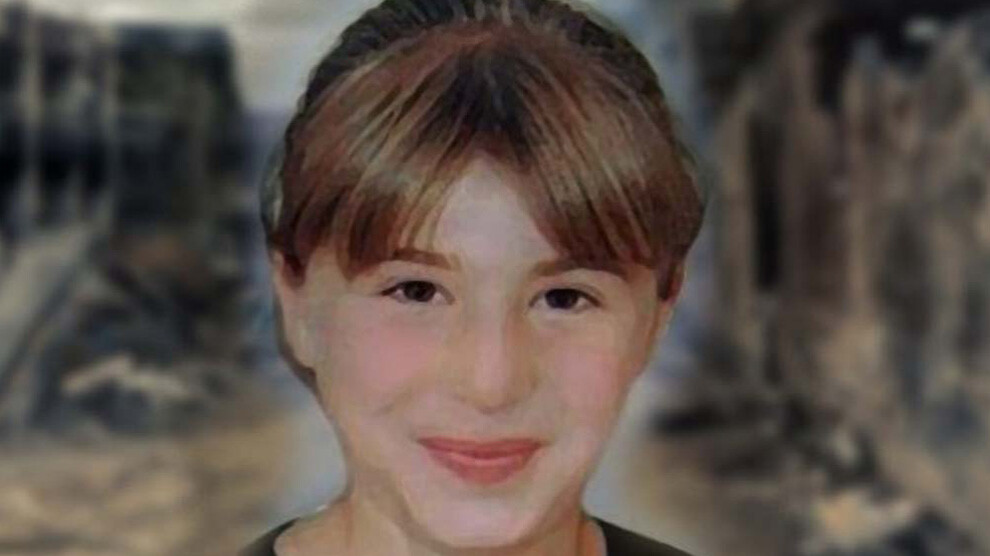The family of Fatma Elarslan, who was killed by security forces in Hezex five years ago, has lodged a complaint with the Turkish Constitutional Court. The constitutional complaint is directed against recruitment notes by judicial authorities, which represent a violation of fundamental rights on several points, said lawyer Veysel Vesek, who legally represents the girl’s family. Fatma Elarslan was only twelve years old when she died on March 7, 2016 in the northern Kurdish city of Hezex (Idil) near Şirnex (Şırnak) during the curfew.
Turkish judiciary: girl was “neutralized terrorist”
With the constitutional complaint, the parents of Fatma Elarslan defend themselves against official and judicial decisions to stop the investigation and not to order a public charge. According to the Turkish judiciary, her killing is legally legitimate, as she is said to have been a “neutralized terrorist” in the course of confrontations. The only “evidence”: the statements of an anonymous “witness” who, according to Vesek, appears in around 300 trials against people from Hezex who are said to have participated in the resistance for self-administration. Vesek justified the constitutional complaint with the fact that the police and public prosecutor’s investigations were not impartial and were carried out incompletely. In addition, discrediting Fatma as a “terrorist” contradicts the case law of the European Court of Human Rights (ECHR) and the United Nations (UN) Convention on the Rights of the Child. Vesek also referred to logs of the Turkish security authorities about clashes during the curfew in Hezex. Even according to the police, on the day Fatma Elarslan died, there were no skirmishes between armed groups and security forces.
Fatma Erarslan’s ID
The history
At the beginning of September 2015, the Turkish state imposed a curfew on Hezex. It was the first of a chain of curfews that continued until spring 2017, as self-government had previously been proclaimed in a number of Kurdish cities and municipalities. According to official figures, 1,464 people were killed in the course of the military siege in Northern Kurdistan. However, the number of unreported cases is likely to be much higher. At least 127 people were victims of Turkish state violence in Hezex. One of them was Fatma Elarslan. When a curfew was declared over the city on February 16, 2016, the seventh grader was outside playing. According to witnesses, after Turkish security forces entered her neighborhood, she took refuge in a house. On the evening of March 7, 2016, an aunt identified the girl’s body in the state hospital in the city of Mêrdîn (Mardin), 130 kilometers away. If Fatma Elarslan had lived, she would have turned thirteen a month later.
Death from gunshot wounds and injuries from ammunition explosions
According to the investigation, Elarslan’s lifeless body was found under a pile of stones in a public square in Hezex city center. Next to her were the bodies of nine other people. The autopsy report states that her death was caused by gunshot wounds and injuries from the explosion of ammunition. “In fact, that means that Fatma was extrajudicially executed,” says lawyer Veysel Vesek. The file also states that the firearms from which the projectiles were fired cannot be determined. This is superfluous anyway, since, like the other dead, Fatma Elarslan was a “member of the organization” – meaning the PKK. The testimony revealed that the girl “participated in armed acts against police officers” and “was killed in clashes by security forces”. The officers did not act incorrectly as they simply followed the “orders given in the course of the curfew”. “To fulfill an operation order, they stopped [die Sicherheitskräfte] in neighborhoods where members of the organization carried out attacks with weapons and bombs. So was their action [die Tötung von Fatma Elarslan] legally legitimate. “
Last step: going to the ECHR
All previous legal remedies before specialized courts to ward off the violation of fundamental rights ended in the case of Fatma Elarslan with the same reason: there was no reason to order the reopening of the investigation, since “after viewing the evidence, it is likely that possible suspects will be acquitted”. Incidentally, the victim is “already dead”. Because of a procedural obstacle, no further investigations are to be carried out posthumously. Should Vesek also fail with his complaint to the Constitutional Court, there is nothing left but to go to the ECHR in Strasbourg.
Several similar cases
“In the Kurdish regions there are a number of cases of minors who were killed during the curfew. Their investigation files were also closed with these reasons, ”complains Vesek. “If we really want to talk about the rule of law and justice in this country, we must first stop creating a legal basis for the murder of children. Your death is not legitimate. This injustice must be atoned for. “
–


